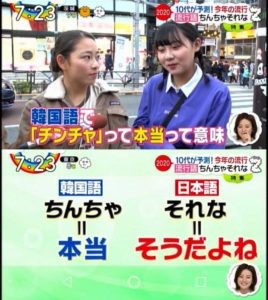
韓国人の私が気づいた日本語の面白い点
多文化情報
こんにちは。経営支援部の石原です。
韓国人インターンの康が、日本語と韓国語を比べて気づいた面白い点をまとめたブログをご紹介いたします。
若者の間では韓流ブームが根強く続いていますね。我が家の子供たちも韓国の歌やドラマから自然に韓国語を学んでいるようです。2つの言語から派生した新たな流れにも触れられていて、興味深い内容になっています。
(日本語の後に英語が続きます。)
こんにちは、康です。
本日は韓国人の私から見て、日本語の面白い部分についてお伝えいたします。
以前、インタビューの質問として「What is the weirdest thing for you in Japan?」という質問をもらい、とても悩みました。日本に住んでかなり経っているため、特に慣れないことはありませんでした。悩んでいたところ、日本の大学に入学してから日本人の友達に会い、言語においていくつかの面白い点に気づきました。
その一つは「日本には相手を呼ぶ時に気軽に使える「YOU」という言葉がないこと」です。
韓国では、ほとんど友達の間でお互いを呼ぶ時に「야(や)」または「너(の)」という簡単な一言を使っています。また、韓国には先輩や年上の人を呼ぶ時、お姉さんを意味する「언니(おんに)」とお兄さんを意味する「오빠(おっぱ)」という、少しスペシャルな単語があります。そのため、人の名前を呼ぶことに慣れていないのかもしれません。
もちろん名前で呼ぶ時もありますが、個人的には気まずくて主に親しくない友達を呼ぶ時だけ使っています。
しかし、日本ではほとんどが「OOちゃん」や「OO 君」のように名前で呼んでいることがわかりました。「きみ」や「あなた」という言葉もありますが、それらは友達同士で使うと気まずくなるので、このような言葉使いが韓国とは異なっていると思いました。
また、多くの日本人女性が「可愛い」という言葉を頻繁に使っていることも面白かったです。私の気のせいかとも思いましたが、学校の授業で日本人の友達からも「そんな傾向がある」ということを聞いて、やっぱり!と思いました。
他人のファッションや化粧などを褒めるために使っていることは既にわかっていましたが、ある友達が「この苺のケーキ可愛い!」と言ったことを聞いて、「どうしたら苺のケーキが可愛くなるのか」疑問に思いました。
 最近は、韓国語と日本語を合成して作った面白い表現を聞きました。
最近は、韓国語と日本語を合成して作った面白い表現を聞きました。
「チンチャそれな」という言葉です。
韓国語の「チンチャ(진짜)」は日本語の「本当に」と同じ意味で、「それな」は相手が言ったことに共感や同意する時に使われている日本語の新語です。
この二つの単語を合わせた表現が、最近の若者同士で流行していることはとても面白いと思いました。
Hello, I am Dayeon.
Today, I would like to introduce the interesting aspects of the Japanese language from the Korean perspective.
I agonized a lot to answer an interview question, “What is the weirdest thing for you in Japan?”. To be honest, there was nothing made me feel strange because I’m already used to living in Japan by living here for 12 years.
However, after I entered university, I could find several interesting points related to language while meeting Japanese friends.
One of them is “There is no particular word to refer YOU which could be used between friends in Japanese.”
In Korea, most people use simple words such as “야(ya)” or “너(neo)” to call their friends. Moreover, there are special words like ‘Oni’ which means elder sister and ‘Oppa’ which means elder brother. These could be reasons why I am not used to calling people by their names.
They sometimes call the name of each other, but it might be only between friends who are not close with and I do not like to call the names because it makes me get goosebumps. Therefore, I call the names only to friends who are not close to me.
In Japan, however, I realized that most people call friends by their name, such as “OO-Chan” or “OO-Kun.” There are words like “Kimi” and “Anata”, but those words do not seem to fit perfectly to the situation, so I thought that is different from Korea.
Additionally, I realized that many Japanese girls say the word “kawaii” very frequently.
I have already known that they mostly use “kawaii” to compliment their friends with what they wore or how they put on makeup.
However, I saw one of my Japanese friends say it when she saw a well-decorated sweet dessert, like “Kono Ichigono Keiki kawaii”. I could not understand how a strawberry cake can be cute but I thought it is one of the interesting Japanese word expressions.
Recently, I heard an interesting expression combined both Korean and Japanese.
It is a word, “Jincha- Sorena”.
The Korean word “Jincha” has the same meaning as the Japanese word “really”, and “Sorena” is a new Japanese word used to express sympathy and consent to what the other people have said.
It was very interesting for me that this compound word of two different countries is popular among young generations in these days.
